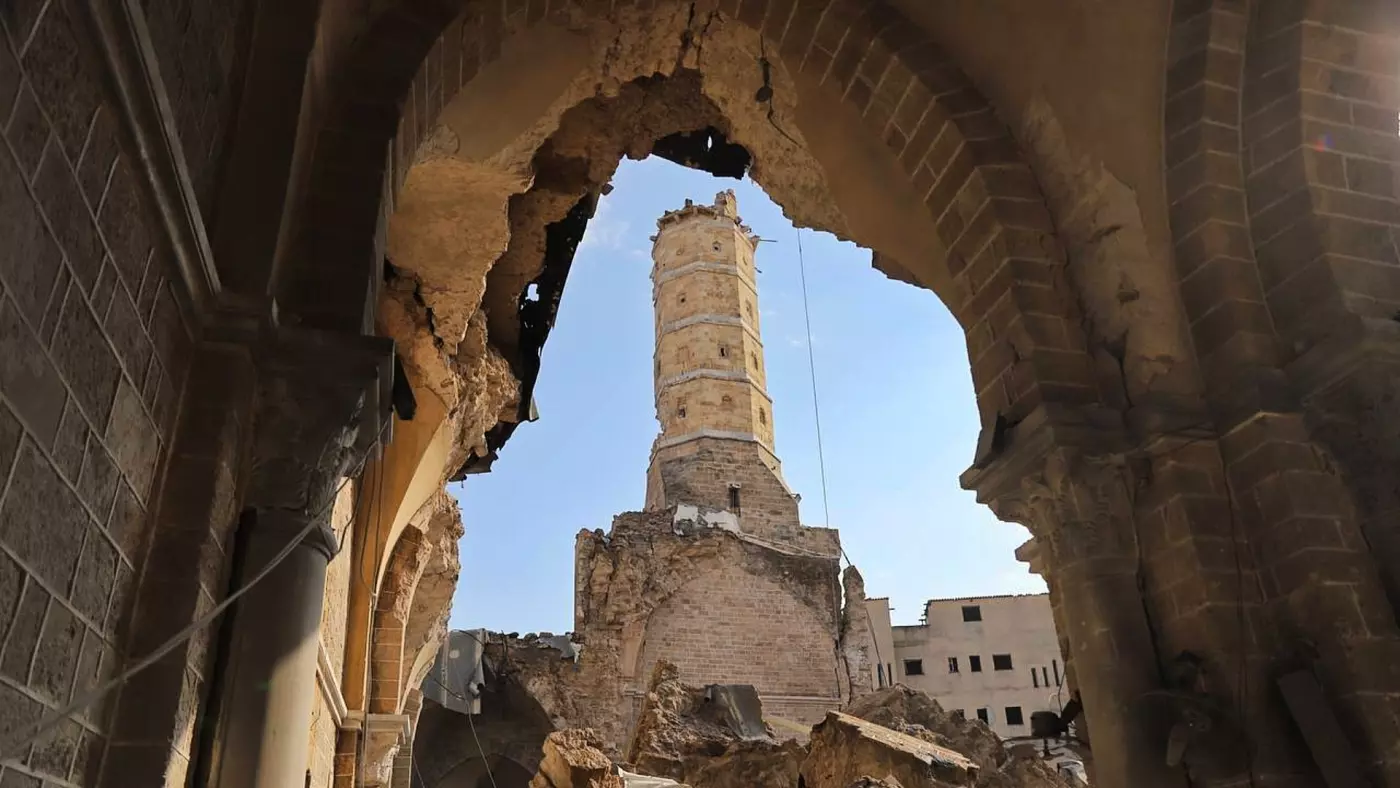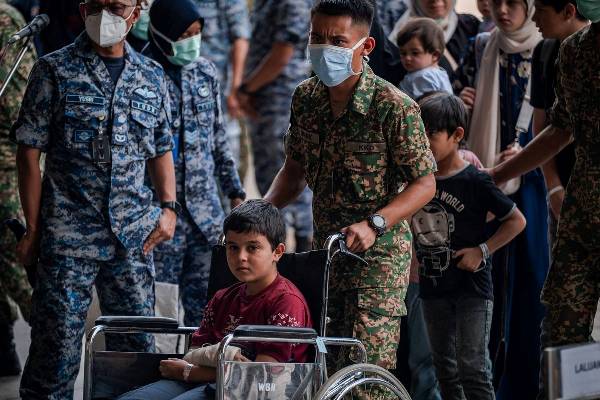Amid an upswell of student support for Palestinians, Israel advocacy groups are weaponizing civil rights law to quell dissent.
IN FRONT OF Columbia University’s Low Memorial Library, seven infant-sized bundles of white cloth rested on the steps, splattered with red paint. Behind the swaddles, plywood boards read “10,600 lives slaughtered,” “4,412 children,” and “let Gaza live,” alongside images of Palestinian flags and olive trees.
This was the scene where Columbia students gathered last Thursday for a “peaceful protest art installation” and demonstration organized by the campus chapters of Jewish Voice for Peace and Students for Justice in Palestine. Hundreds of students demanded that Columbia publicly call for a ceasefire in Gaza, divest its endowment from corporations complicit in Israeli apartheid, and end its academic programs in Tel Aviv.
The next day, Gerald Rosberg, chair of the Special Committee on Campus Safety, announced Columbia had suspended its chapters of JVP and SJP through the end of the semester, citing an “unauthorized event” that “included threatening rhetoric and intimidation.” The announcement quickly drew widespread criticism, including from hundreds of Jewish faculty who denounced the “vague allegations” that served as grounds for the suspensions.
But amid the backlash, StandWithUs, a self-described “non-partisan Israel education organization,” lauded Columbia’s decision. “StandWithUs sent several legal letters to universities like @Columbia, urging them to immediately hold these groups accountable for the hate, fear, and harassment they incite on campus,” the group wrote on social media. “We hope more universities will follow suit.”
Alongside Israel advocacy groups like the Brandeis Center, the International Legal Forum, and the David Horowitz Freedom Center, StandWithUs has spent years trying to shut down criticism of Israel on college campuses, often by weaponizing civil rights law. The groups allege that, while the political speech may be protected by the First Amendment, it fosters a campus climate of antisemitism in violation of Title VI of the Civil Rights Act, which prohibits federally funded programs from discriminating on the basis of race, color, or national origin. As students have ramped up pro-Palestinian demonstrations over the past month, Israel advocacy groups have escalated a pressure campaign of their own.
Earlier this month, StandWithUs sent an open letter to thousands of universities addressed to the general counsel and vice president of student affairs, outlining actions colleges could take to ensure compliance with Title VI. The group’s recommendations include requiring student identification cards at protests, monitoring university communication channels for “biased statements about Israel,” and investigating student groups for ties to Hamas. The group has also sent a surge of direct letters urging administrators to clamp down on specific Palestine solidarity campus events. Meanwhile, on November 9, the Brandeis Center filed two Title VI complaints with the Department of Education against the University of Pennsylvania and Wellesley College. (The Brandeis Center also joined forces with the Anti-Defamation League to call on the presidents of nearly 200 universities to investigate their SJP chapters, alleging they could have ties to Hamas that would constitute “materially supporting a foreign terrorist organization.”)
“If you can’t win the debate because the facts aren’t in your favor, it’s pretty sensible to try to stop it altogether.”
According to Dylan Saba, a staff attorney at Palestine Legal, the groups tend to target “pretty mundane examples of pro-Palestine expression … because that’s precisely what these organizations are trying to get rid of.” But as Israel’s military assault over the past month has become “increasingly indefensible for the pro-Israel forces,” it’s spurred a new wave of Title VI threats.
“That’s what’s motivating the strategy to try to raise the stakes of Palestinian expression and organizing by getting universities to try to crack down on it,” said Saba. “If you can’t win the debate because the facts aren’t in your favor, it’s pretty sensible to try to stop it altogether.”
Crackdown at Columbia
The Title VI crusade adds even more fuel to the recent punitive actions against Palestine solidarity student groups.
Since the start of Israel’s bombing of Gaza, students at Columbia have organized numerous protests, vigils, and rallies in a show of support for civilians in Gaza. As part of a nationwide “Shut it Down for Palestine” walkout on November 9, SJP and JVP arranged an art installation and rally.
One day later, the groups were suspended for the unauthorized event and “threatening rhetoric and intimidation,” making them ineligible to hold campus events or receive school funding for the remainder of the term.
While university policy requires students to obtain a permit 10 days before an event, violations of policy usually result in a disciplinary proceeding against individual students, not an outright suspension of an entire organization, according to Katherine Franke, a law professor at Columbia University who has been serving as a faculty advocate for the sanctioned students.
Franke noted that the organizations were suspended by a newly formed group, the Special Committee on Campus Safety, which was created with no advance notice and did not go through the standard University Senate Executive Committee approval process. Columbia’s website does not contain any mention of the Special Committee before the November 10 announcement, which did not elaborate on the new committee’s members or purview.
“We don’t know who’s on it, who created it, what its authority is, under what rules is it operating.”
“We don’t know who’s on it, who created it, what its authority is, under what rules is it operating,” said Franke. Franke has asked Rosberg, the chair of the Special Committee, for more information about the new group and the specific rhetoric that led to SJP and JVP’s sanctioning. She says she has not received a response.
Additionally, internet archives show Columbia quietly updated its student group event policy some time between June 12 and October 20 to include new language around the sanctioning of student organizations “for failure to obtain event approval and/or not abiding by terms of an approved event.”
“They edited the student conduct rules without any consultation with the groups that normally are required to be consulted,” said Franke.
Columbia University did not respond to a request for comment.
During her 25-year tenure, Franke noted she’s seen “a lot of demonstrations,” from the Iraq War to 9/11. “All manner of things have been debated, protested, and the university’s structure was able to handle it,” she said. “But somehow, they had to create — without any consultation with any of the responsible governing bodies — a whole new way of dealing with these issues.”
Columbia is one of three private universities that have now sanctioned their SJP chapters in an unprecedented cascade of crackdowns on student organizing around Palestine solidarity.
Earlier this month, Brandeis University announced an outright and total ban on its SJP chapter, claiming the group “openly supports Hamas.” On Tuesday, George Washington University suspended its SJP chapter from hosting on-campus events for three months.
Roz Rothstein, co-founder and CEO of StandWithUs, wrote in a statement to The Intercept that after the group sent letters to thousands of universities, “many responded privately thanking us for the letter or, in the days after receiving it, taking concrete action on their campuses, such as Columbia, Brandeis, and GWU banning SJP for the rest of the semester.”
She added, “Other schools have notified us that they have launched independent investigations or task forces to address antisemitism. We look forward to seeing the results of those inquiries.”

Changing Standards
At Pomona College in Claremont, California, student organizers have also been challenged by a shifting web of guidelines. Samson Zhang, an editor of a student publication focused on leftist campus organizing called Claremont Undercurrents, noted that new policies seemed to arise in direct response to specific Palestine solidarity campus actions.
In one instance, 150 students attended a vigil at the student services center. “It was very intentionally organized so that no club claimed it, and the messaging was that it was organized by everybody and nobody,” said Zhang. “That happened Friday, and by Monday they sent out an email with a new demonstration policy that an event is only compliant with the student code of conduct if there’s a specific student club that it’s registered under.”
And, on November 7 — the day before a planned divestment protest — Pomona President Gabi Starr sent a letter to students and alumni with a reminder of campus demonstration rules. Claremont Undercurrents reported that one day before Starr’s email blast, StandWithUs sent her a letter expressing concern over the event. The letter urged the administration to take immediate action “to prevent discriminatory treatment of Jewish and Israeli students” and specifically noted that the administration has “the right to prohibit masks worn for the purpose of concealing identity.” Starr’s email similarly states that “masks that prevent recognition of individuals pose a challenge to the ability to maintain campus codes of conduct,” adding that students may be asked to remove them.
In response to inquiries from The Student Life, a campus newspaper, Pomona’s spokesperson said Starr’s mention of masks “was in response to significant concerns related to our own campus — not in response to any outside organization.”
StandWithUs has targeted Pomona before. In April 2021, the Associated Students of Pomona College voted to ban the use of student government funds on items or companies that “knowingly support the Israeli occupation of Palestine” — a move that triggered a swift condemnation from Starr. That same day, StandWithUs sent a letter praising Starr for her statement and calling on her to use “whatever means at your disposal to invalidate this resolution.” Every student government representative that voted in favor of the Boycott, Divestment, and Sanctions resolution that year was then doxxed on Canary Mission, a secretive website that posts public blacklists of Palestinian rights organizers.
One year prior, in February 2020, the David Horowitz Freedom Center wrote to Starr and Pitzer College President Melvin Oliver, claiming that the colleges had violated Title VI by fostering “pervasive, college-sponsored anti-semitism.” The Southern Poverty Law Center has classified Horowitz as an extremist, noting that “the Freedom Center has launched a network of projects giving anti-Muslim voices and radical ideologies a platform to project hate and misinformation.”
“Political Cudgel”
A core ask from groups like the David Horowitz Freedom Center and StandWithUs is that university policies adopt the International Holocaust Remembrance Association, or IHRA, working definition of antisemitism, which critics say falsely equates broad criticism of Israel with antisemitism. The IHRA definition found new footing in 2019, when then-President Donald Trump signed an executive order instructing federal agencies to “consider” the IHRA definition in Title VI enforcement.
“IHRA expressly recognizes that criticism of Israel, similar to criticism of other countries, is not antisemitic,” wrote Rothstein of StandWithUs. “And it recognizes that some rhetoric and actions related to Israel do cross the line into bigotry.”
By eliding meaningful differences between critique of Israel and Jewish discrimination, said Saba of Palestine Legal, the groups warp claims of antisemitism into a “political cudgel” to be wielded against students voicing solidarity with Palestine.
The Brandeis Center’s recent Title VI complaint against the University of Pennsylvania conflates disparate events as uniform examples of campus antisemitism. The letter notes recent disturbing attacks against Hillel, a Jewish student organization, including bomb threats and an instance in which a Penn student vandalized the Hillel building and yelled “fuck the Jews.” But the letter also highlights Penn’s “Palestine Writes” literature festival, condemning the September event’s inclusion of speakers “known for their aggressive stance against the Jewish State.”
In November 2022, the International Legal Forum, an Israel-based organization dedicated to “fighting legal battles against terror, antisemitism, and de-legitimization of Israel,” filed a Title VI complaint against the University of California, Berkeley School of Law, after nine student groups banned supporters of Zionism from speaking at their events. In its complaint, the group wrote, “Zionism is an integral and indispensable part of Jewish identity.”
Since its founding in 2001, StandWithUs, which is registered as a nonprofit under the name “Israel Emergency Alliance,” has launched efforts to oppose “anti-Israel bias” in libraries, supported anti-BDS laws, and encouraged supporters to buy Caterpillar stock amid scrutiny over the construction company’s role in Israel’s demolition of Palestinian homes. The group recruits annual student fellows to serve as pro-Israel activists on American campuses nationwide and once invited Elvis Costello on a VIP trip in an attempt to convince the singer to change his mind about canceling concerts in Israel.
Last year, StandWithUs filed a Title VI complaint against George Washington University, after assistant professor of clinical psychology Lara Sheehi hosted a brown-bag lunch with a Palestinian professor, leading to a pressure campaign and an internal investigation that turned up nothing. “Many of the statements the complaint alleges were made by Dr. Sheehi were, according to those who heard them, either inaccurate or taken out of context and misrepresented,” the university said in a summary of its findings at the time, adding that Sheehi had “denounced antisemitism as a real and present danger” in classroom discussion. StandWithUs refuted this characterization. In February, Palestine Legal filed its own Title VI complaint against GWU for a “hostile environment of anti-Palestinian racism,” which cites the Sheehi case among others.
“The byproduct of all of this is that you have now a lot of obfuscation about what the meaning of antisemitism is and what constitutes antisemitism, which is very dangerous for Jewish students on campus,” said Saba. “It makes it much more difficult to be able to identify and work to eliminate real instances of antisemitism and threats to Jewish students, which tend to come from the political right.”
“It makes it much more difficult to be able to identify and work to eliminate real instances of antisemitism and threats to Jewish students.”
Meanwhile, many members of the Jewish community are resisting these groups’ efforts to conflate Judaism and Zionism, noting that their faith inspires resistance to injustice, not blanket support for a regime.
“A lot of institutions across the country, and also at the university, have pushed this idea of a hegemonic Jewish community that all shares the same political beliefs,” said Rafi Ash, a Brown University sophomore who was one of 20 Jewish students arrested during a November sit-in at an administrative building organized by BrownU Jews for Ceasefire Now. “We all have been kind of disturbed by the ways in which a Jewish identity has been twisted in a way that makes it political.”
While the Department of Education is expected to field a new influx of Title VI complaints from organizations representing Jewish students, Saba noted that groups like Palestine Legal have also filed complaints regarding instances of anti-Palestinian, anti-Arab, and Islamophobic discrimination on campuses. The Department of Education has never made a finding of antisemitic or anti-Palestinian discrimination in any of its investigations so far, though that could soon change as the Israel–Hamas war puts Title VI in the limelight. The American Civil Liberties Union has begun to take legal action over the First Amendment rights of Palestinian solidarity protesters.
“We are in touch with many, many, many student groups across the country, and we are seeing a pattern of heightened scrutiny and suppression,” said Saba. “Fortunately, despite the mass suppressive effort, students are continuing to organize, continuing to speak out, and are refusing to be silenced. We’re seeing one of the largest upsurges in pro-Palestine organizing and demonstration that we’ve ever seen.”
Post Disclaimer | Support Us
Support Us
The sailanmuslim.com web site entirely supported by individual donors and well wishers. If you regularly visit this site and wish to show your appreciation, or if you wish to see further development of sailanmuslim.com, please donate us
IMPORTANT : All content hosted on sailanmuslim.com is solely for non-commercial purposes and with the permission of original copyright holders. Any other use of the hosted content, such as for financial gain, requires express approval from the copyright owners.
 Sri lanka Muslims Web Portal Sri Lanka Muslims News Center
Sri lanka Muslims Web Portal Sri Lanka Muslims News Center


 Donate
Donate


